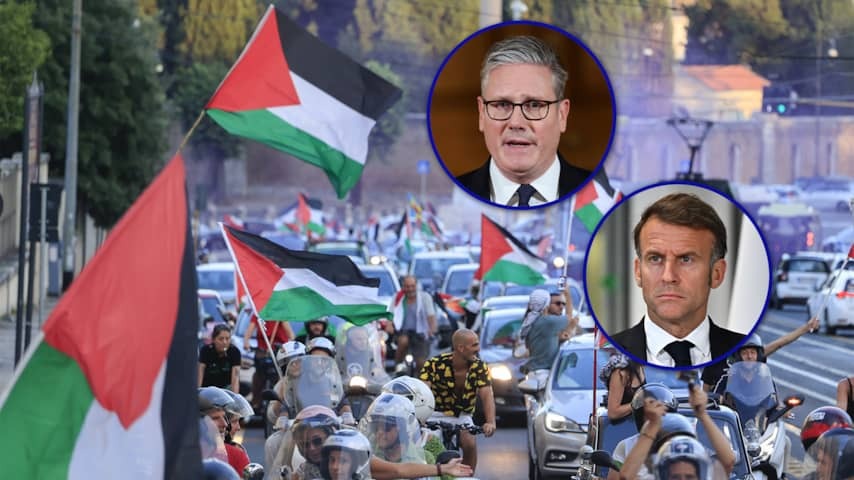
France is changing, Canada has promised, and the United Kingdom is threatening. The recognition of the State of Palestine is stirring Western governments. Experts see it mainly as a symbolic attack on Israel and doubt whether the average Palestinian is helped by it.
France will recognize Palestine in September as the 148th of the 193 UN countries. Norway, Spain, Ireland and Slovenia already preceded the French last year. The United Kingdom and Canada may follow in September. But still, mainly Western countries are colorless on the world map full of recognizers. It’s about more than just the Palestinian Territories.
More and more Western governments are feeling an increasing discomfort about developments in Gaza. “We see the consequences of the food blockades on television every day,” says university lecturer in international relations Peter Malcontent.
Western leaders cannot remain silent after the ongoing pro-Palestinian demonstrations in their countries. But the recognition of a Palestinian state is sometimes used as a plaything. For example, British Prime Minister Keir Starmer threatened on Tuesday to recognize Palestine if Israel does not immediately stop the aggression in the Palestinian Territories.
According to experts, this statement shows that there is a political game behind the promises and threats. Loose recognitions will not change much, thinks professor of administrative law Wim Voermans. “For that, all major countries have to take that step, including the United States.”
Countries don’t want disadvantages themselves
Western countries are struggling with the question of how they can effectively put pressure on Israel. A unanimous European Union is needed for heavy economic sanctions. But the EU has not yet been able to make a fist. This is mainly because important players like Germany and the Czech Republic are obstructing.
Countries want to make a difference, but also look at what hurts them the least, explains international law lawyer Alex Takkenberg. Trade barriers can affect their own economy, while recognizing a country in principle costs no money.
The experts call the recognition of Palestine mainly a symbolic sanction. Malcontent: “Hopefully it is the first step towards European sanctions that can really hurt. But not much changes. The average Palestinian is not helped by this.”
‘We end up on the wrong list’
With the recognition of a Palestinian state, the pressure increases in two ways. On the one hand, on the countries that do not yet have Palestine on the world map. “Three-quarters of the world already do this. It is becoming increasingly uncomfortable for countries to stay behind,” says Takkenberg.
If the United Nations recognize you, you can usually speak of general recognition, Voermans emphasizes. The UN is dominated by the Security Council. Voermans: “If even one of them does not recognize you, like the US, you will never really be admitted to the UN.” According to the professor, the pressure on the US is increasing, because France and the UK – also members of that Security Council – are moving towards recognition.
Moreover, these recognitions further fuel the discussion in Israel itself, Malcontent sees. “There, the realization is slowly dawning: we are ending up on the wrong list of countries. Then we belong to the pariahs of the international community.”
Israeli citizens are increasingly noticing the consequences. For example, Malcontent mentions an Israeli cruise ship that did not dock at a Greek island after heavy protests. “Israelis support the war against Hamas, but they see their image on the international stage deteriorating rapidly.”
Big countries make the difference
Voermans explains what full recognition can mean for a state. “For other states, you are then fully legally authorized. They may not violate your sovereignty. Then Israel has nothing more to look for in Gaza and the West Bank. Officially, that is now seen as a kind of domestic conflict.”
In 1933, the Treaty of Montevideo stipulated four criteria that a state must meet. There must be a permanent population, a defined territory and effective authority of a government. And the most important requirement: you must be recognized by the other states. How and whether that happens, the countries determine themselves.
With the first three elements there are already some obstacles, such as the effective authority of a government. Hamas is seen as a terrorist organization, but the Palestinian Authority is not. But that criterion is not as essential as recognition by other states.
Finally, the professor notes that more and more countries are listening to a two-state solution. Voermans: “Recognizing the state of Palestine is an important step in that.”